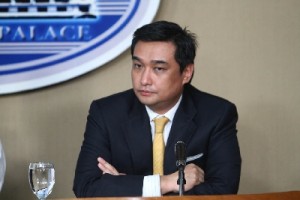Malacañang on Thursday assured the Chamber of Mines of the Philippines (COMP) that the group’s concerns about the implementing rules and regulations of the administration’s mining policy would be looked into without the need to go to court.
“What I can say is that we will study it and we will look into it and if there are reasons for us to… If there are ways that we can address it, then we will,” Strategic Communication Secretary Ricky Carandang said in the face of COMP’s threat to question a section of the IRR of Executive Order No. 79.
EO 79 defines the administration’s mining policy reforms.
Carandang hoped that the COMP’s concerns could be resolved by the government without them having to go to court to question Sec. 8 of the IRR.
“I don’t think anybody wants to see this issue litigated. The best way for it to move forward and the quickest way possible is to avoid litigation. And so that’s not the desired course that we want to take,” he said in a Malacañang briefing.
COMP president Philip Romualdez said it was preparing a “legal action” against Section 9 of the IRR that he was “patently illegal.”
The provision imposes a bidding scheme in the renewal of mining contracts after the first 25 years of a tenement. Mining projects are effective for 50 years.
President Aquino issued EO 79 in July in a bid to boost revenues from the mining sector while increasing environmental safeguards.
Mining moratorium
The IRR extended the ban on new mining permits until Congress passed a law raising royalties on the sector from two percent to five percent.
Carandang said the government was aware of the COMP’s concerns, and was now discussing these with the Mining Industry Coordinating Council (MICC) to determine whether these “may have some basis.”
“The reason why investments have not come into mining—and I’ve said this before—is because the rules for so long have been uncertain and the policies have been uncertain. What we did with the EO 79 was to try to create a set of general principles and rules under which we will allow mining to occur,” he said.
The Secretary, however, could not say if the IRR would be modified.
“We’re looking at the concerns that have been raised and I believe they can be addressed,” he said. “The MICC is concerned that the IRR, of course, be in compliance with the law. And if there is a serious question about that, then we will certainly consider those serious questions.”
Carandang said there was no need for the entire MICC to meet with the COMP.
Lines are open
“I think the Chamber of Mines has been appraised by members of the MICC and I think the lines of communication remain open. So I don’t see any need for the MICC as a whole to meet with the Chamber of Mines at this point. Give us time to look over the concerns that they have expressed and we will do what we can to address them,” he said.
The IRR, Carandang stressed, was intended to refine the rules under which E0 79 would be “operationalized.”
Carandang expressed confidence that once the issues were ironed out, “We believe that we will have a clear set of rules with little ambiguity that will encourage mining companies to come in.”
